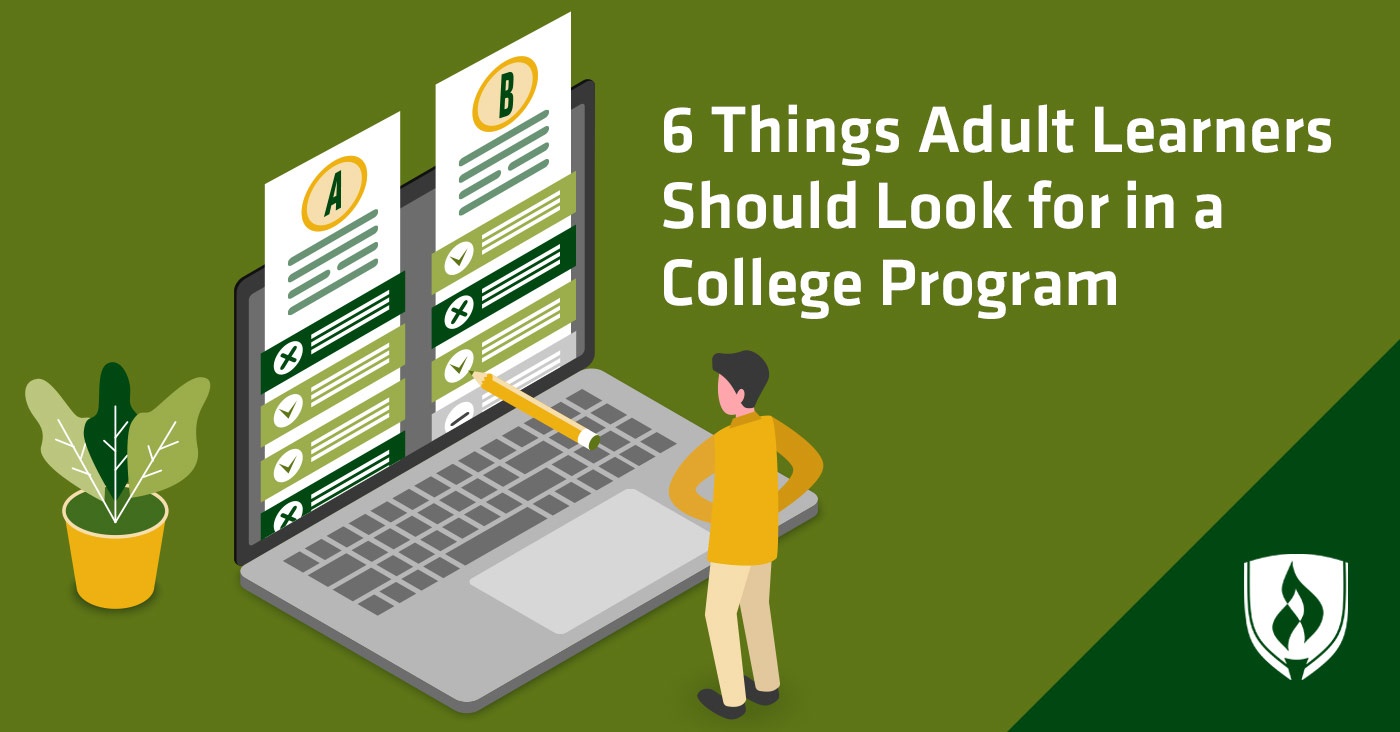
A college education is not a one-size-fits-all experience. The stereotype of a new college student looking forward to dorm life and all-nighters doesn’t reflect reality for many in today’s institutions of higher learning. Adult learners, in particular, often have very different needs and expectations from their programs.
Some colleges are better than others at accommodating those needs. Those with online options certainly have their appeal as they can help older students balance some of the work and other factors that come with getting established in life. But that’s not all an adult student will want to consider.
6 Factors adult learners should consider when looking for a college
Whether you are interested in online college programs or if you are looking for the more traditional on-campus environment, read on! Choosing a college program for adults is a nuanced process, and only you can decide if a particular school matches your requirements.
1. Flexible learning options
Flexibility in a program is critical if you have important priorities in your life right now aside from school. If you are working full time, have children, or provide care to loved ones, your schedule can easily get complicated. Online courses can certainly help with this—and the Empowered Learning® competency-based education (CBE) courses at Rasmussen University can provide even further flexibility.
“Our competency-based education (CBE) courses don’t have weekly log-in times or weekly assignment due dates,” says Rasmussen University Associate Director of Admissions Rachel Machtemes.
These courses are project-based, with simple 14-day attendance policies and only one deadline—the end of the term for the course. Students in these courses have all the resources and information needed to complete their work right from the first day. This gives students a huge amount of control over how they approach their learning—instead of trying to fit work into a daily schedule, they can focus their effort during times that work best for their schedule. Additionally, this approach can be a positive for those with relevant life experience, as you may be able to “work ahead” and tackle subjects you’re already comfortable with.
“For students already in a career field, it’s really valuable to them because they can finish the course and receive the credit for the experience and skills they already have,” Machtemes says.
Visit the Rasmussen University Empowered Learning® page for more details about the benefits of CBE.
2. A straightforward credit transfer process
Are you bringing in credits from other schools? Machtemes says concerns about transferable credits are a common query she hears from prospective students. Before you invest in a program, you probably want to know which of your credits from elsewhere they will accept.
“We only require an unofficial transcript for review before the student even enrolls,” Machtemes says. She explains that Rasmussen University will review each student’s transcript and identify which credits will transfer, which will not transfer—and an explanation behind those choices, before a student commits to the program.
Looking for more information about credit transfer policies? Our article, “Will My Credits Transfer? Answering Common Questions Transfer Students Ask”, can help!
3. A variety of academic offerings
Depending on your field or your career of interest, you may not need a bachelor’s degree, master’s degree or similar. For some adult learners, a less time-intensive academic option like a certificate, diploma or training can help bridge skills gaps and help them retool for new career opportunities.
“Certificate options are huge with our students,” says Machtemes. “Getting to an end goal a little bit sooner is a common priority for adults with other life-commitments.”
While these offerings might not be a perfect fit for every career, they work very well for certain fields and can provide a foundation for further education if needed.
“Many of the students we work with in early childhood education and medical billing and coding, for example, are in the field already and need a certificate to move forward.”
4. Support through obstacles
When you have more important priorities in your life, school can be the first thing to fall off your schedule if a barrier arises. Some students are supporting and caring for other people, focusing on a job or managing health issues.
“If you’ve had a bad experience in school before, you might feel like throwing up your hands when you hit an obstacle,” Machtemes says. Adding school to everything you already deal with might suddenly seem like a bad idea. This is where adult learners need additional support and flexibility.
Maybe this means you know who to call when you hit a barrier. Maybe this means your program offers extra options or other forms of instruction you can switch to if needed. But above all, you need to know you are supported and that the people running your program want to see you thrive.
“For us, it’s a matter of understanding and being able to fully communicate with someone. We understand that they have other life commitments,” Machtemes says. “Having this flexibility and additional support gives them the confidence that they can be successful in their studies, that we are trying to find ways to help them meet their goals.”
5. Responsive instructors and staff
If you are in an online program, communication should be a priority for all the representatives of that program from start to finish. No one wants to be left spinning their wheels while they wait for answers, assistance or further direction. Machtemes says it’s a standard practice for admissions advisors at Rasmussen University to conduct an interview right away with prospective students to ask them about their goals and academic interests. “This really helps us to build rapport with the students,” she explains.
Machtemes says these conversations with students will often reveal different areas of aptitude or interest, which then helps her guide them to an academic program that fits their needs. Admissions and academic advising are just one piece of the puzzle here—there’s also technical support, library services and other support offerings that can help adult students make the transition to college life as smooth as possible.
6. Affordability
Maybe education is something you believe in investing in, but you still don’t want to get over your head in expense. Adult learners want to ensure they can afford to enroll in a program and that their investment is likely to pay off in the long run. Machtemes says affordability is consistently one of the primary priorities of prospective students—and that should come as no surprise. There are quite a few variables that can affect the overall cost of attending college—length of program, number of courses completed each term, distance traveled, and so on—but there are also ways to potentially save. Self-directed assessments, subscription-based pricing and scholarships can all help make college more affordable.
Looking for more information about the potential cost? The Rasmussen University Tuition Estimator tool can help.
College programs for adults
Some schools make intentional moves to change the traditional style of education to better fit students of all ages. It can be comforting to know that the minds designing the curriculum and the program structure were crafting the whole thing with adult learners in mind.
There are so many choices to make in education—and that’s not even counting the concerns about if you can bring this new thing into your life right now. If you could use some inspiration on what other adult learners experienced, check out our article, “5 Stories That Prove Going Back to School at 30 Is Possible.”
Graduates of Early Childhood Education programs at Rasmussen University are not eligible for licensure as a teacher in an elementary or secondary school. A Bachelor’s degree and a state teaching license are typically required to work as a teacher in a public school and some private school settings. States, municipalities, districts or individual schools may have more stringent licensing requirements. Students must determine the licensure requirements in the state and school in which they intend to work..
Childcare facilities and the states in which they are located establish qualifications for staff who work with children, and often implement guidelines regarding age, education, experience and professional development. Students must determine the licensure requirements for the state and facilities in which they work.
This program has not been approved by any state professional licensing body, and this program is not intended to lead to any state-issued professional license. For further information on professional licensing requirements, please contact the appropriate board or agency in your state of residence.




